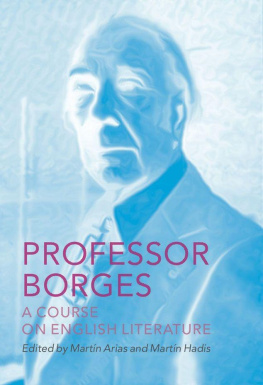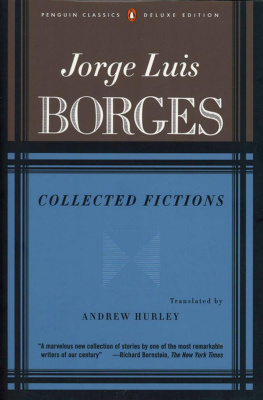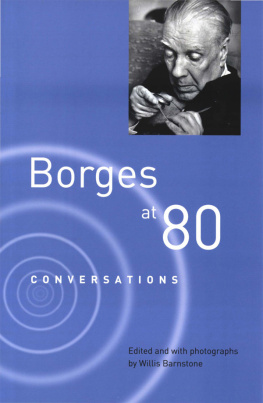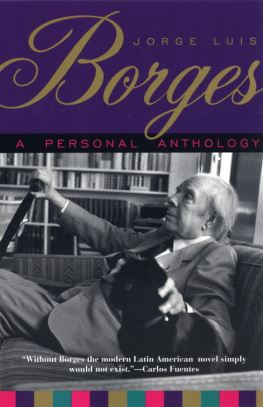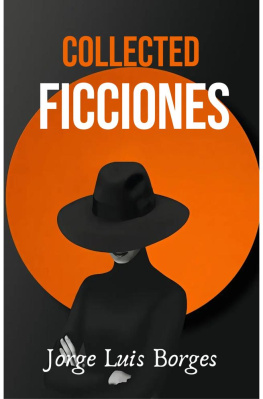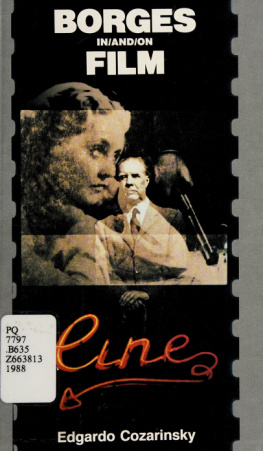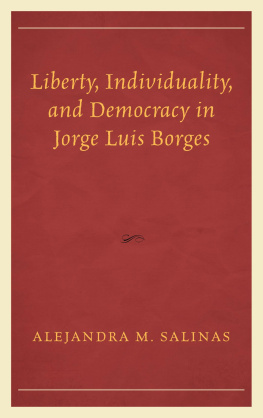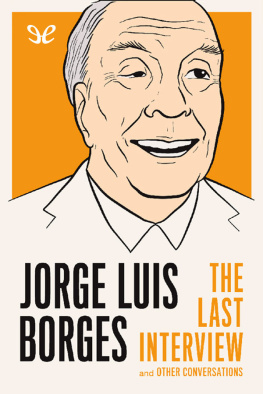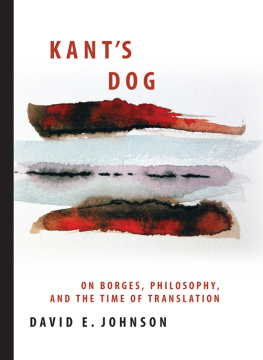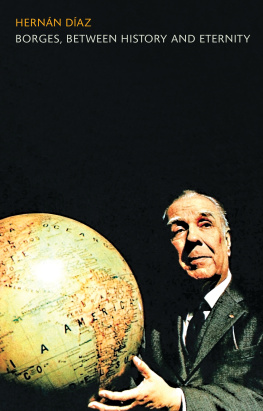PROFESSOR BORGES
A COURSE ON
ENGLISH LITERATURE
JORGE LUIS BORGES
EDITED, RESEARCHED, AND ANNOTATED
MARTN ARIAS AND MARTN HADIS
TRANSLATED FROM THE SPANISH BY KATHERINE SILVER
A NEW DIRECTIONS BOOK
TABLE OF CONTENTS
The Anglo-Saxons. Genealogy of the Germanic kings. Poetry and kennings.
Beowulf. Description of the Germans. Ancient funeral rites.
Beowulf. Bravery and boastfulness: Beowulf as compared to the compadritos.
The Finnsburh Fragment. The Vikings. Anecdotes from Borgess trip to York. The Battle of Brunanburh. Tennysons translation.
The Battle of Maldon. Christian poetry. Caedmons Hymn. The runic alphabet. Characteristics of Anglo-Saxon elegies.
The origins of poetry in England. The Anglo-Saxon elegies. Christian poetry: The Dream of the Rood.
The two books written by God. The Anglo-Saxon bestiary. Riddles. The Grave. The Battle of Hastings.
A brief history until the eighteenth century. The life of Samuel Johnson.
Rasselas, Prince of Abyssinia, by Samuel Johnson. The legend of the Buddha. Optimism and pessimism. Leibniz and Voltaire.
Samuel Johnson as seen by Boswell. The art of biography. Boswell and his critics.
The romantic movement. The life of James Macpherson. The invention of Ossian. Opinions about Ossian. Polemic with Johnson. Reappraisal of Macpherson.
Life of William Wordsworth. The Prelude and other poems.
The life of Samuel Taylor Coleridge. A story by Henry James. Coleridge and Macedonio Fernndez, compared. Coleridge and Shakespeare. In Cold Blood, by Truman Capote.
Coleridges final years. Coleridge compared to Dante Alighieri. Coleridges poems. Kubla Khan. Coleridges dream.
The life of William Blake. The poem The Tyger. Blake and Swedenborgs philosophy, compared. A poem by Rupert Brooke. Blakes poems.
Life of Thomas Carlyle. Sartor Resartus by Carlyle. Carlyle, precursor of Nazism. Bolvars soldiers, according to Carlyle.
The Victorian era. The life of Charles Dickens. The novels of Charles Dickens. William Wilkie Collins. The Mystery of Edwin Drood, by Dickens.
The life of Robert Browning. The obscurity of his work. His poems.
Robert Brownings poems. A chat with Alfonso Reyes. The Ring and the Book.
The life of Dante Gabriel Rossetti. Evaluation of Rossetti as a poet and a painter. The theme of the double (fetch). A book of exhumed poems. Rossettis poems. History cyclically repeated.
Rossettis poem. Rossetti as seen by Max Nordau. The Blessed Damozel, Eden Bower, and Troy Town.
The life of William Morris. The three subjects worthy of poetry. King Arthur and the myth of the return of the hero. Morriss interests. Morris and Chaucer. The Defence of Guenevere.
The Tune of the Seven Towers, The Sailing of the Sword, and The Earthly Paradise, by William Morris. The Icelandic sagas. The story of Gunnar.
The Story of Sigurd the Volsung, by William Morris. The life of Robert Louis Stevenson.
The works of Robert Louis Stevenson: New Arabian Nights, Markheim, The Strange Case of Dr. Jekyll and Mr. Hyde. Jekyll and Hyde in the movies. The Picture of Dorian Gray, by Oscar Wilde. Requiem, by Stevenson.
, by Martn Arias
, by Martn Hadis
I know, or rather Ive been told because I cannot see, that more and more students keep coming to my classes, and that many of them are not even registered. So, I guess we can assume they want to listen to me, right?
Jorge Luis Borges, interview with B.D., 1968,
published in Clarn on December 7, 1989
Citations from Literaturas germnicas medievales [Medieval Germanic Literature] and Breve antologa anglosajona [Brief Anglo-Saxon Anthology] refer to the 1997 edition of Obras completas en colaboracin [Complete Collaborative Works] (OCC) published by Emec Editores.
Other citations from other works by Borges refer to the edition of his Obras completas [Complete Works] (OC), published by Emec Editores in Buenos Aires in 1997.
When a chapter number of a saga is indicated in a note, this always corresponds to the edition that appears in the Bibliography, at the end of this volume.
TRANSLATOR'S NOTE: In certain passages, we have retained Borgess translations into Spanish of poetry originally written in English. We have added alongside, in brackets, the corresponding lines of the English original except when those lines appear in the text nearby.
ABOUT THIS BOOK
These classes were recorded by a small group of students of English literature so that other students, who couldnt attend class because they were working, would be able to study the material. The transcriptions of these recordings, produced by the same students, form the basis of this book.
The tapes have been lost; they were probably used to tape other classes, in other subjects. Such carelessness might seem unpardonable to us today. However, we need to understand that in 1966the year these lectures were givenJorge Luis Borges was not yet considered the indisputable genius he is today. With the constant political changes in Argentina, his statements about current events received more publicity than his literary work. For many of the students in his class, Borgesthough an eminent writer and director of the National Librarymust have simply been one more professor. The transcriptions of the classes, therefore, were made for the purposes of studying the material, and were probably done quickly in order to prepare for the exam.
We might, in fact, be grateful for this: there was no attempt to modify Borgess spoken language, nor edit his sentences, which have reached us intact with their repetitions and their platitudes. This fidelity can be verified by comparing Borgess language here with that of other texts of his oral discourse, such as his many lectures and published interviews. The transcribers also made certain to note under the transcription of each class the phrase: A faithful version. This faithfulness was maintained, fortunately, not only in Borgess discourse, but also in asides and colloquialisms the professor used to address his students.
On the other hand, due to the transcibers rush and lack of scholarship, each proper name, title, or foreign phrase was written phonetically such that most of the names of the authors and titles of the works were written wrong; the recitations in Anglo-Saxon and English, as well as etymological digressions, were completely illegible in the original transcriptions.
Every single one of the names appearing in the text had to be checked. It was not difficult to figure out that Roseti was Dante Gabriel Rossetti. It took considerably longer, however, to puzzle out that Wado Thoube was, in fact, the poet Robert Southey, or that the transcriber had written Bartle at each mention of the philosopher George Berkeley. Many of these names required laborious searches. Such was the case of the Jesuit from the eighteenth century, Martino Dobrizhofferwho appeared in the original as Edoverick Hofferor of Professor Livingston Lowes, whose name was transcribed as if it were the title of a book, Lyrics and Lows.
The transcribers lack of familiarity with the literary texts under discussion was obvious on many occasions. Names as well known as those of Dr. Jekyll and Mr. Hyde appear in the original with strange spellings, threatening to turn the terrible duality of the character into a multiplicity. For example, Dr. Jekyll is Jaquil, Shekli, Shake, Sheke, and Shakel, whereas Mr. Hyde is Hi, Hid, and Hait, variations that sometimes appear on the same page and even in the same paragraph. It was often difficult to determine if all the variations referred to the same person. Hence, the hero Hengest appears in one line with the correct spelling, but in the next hes turned into Heinrich; the philosopher Spengler is hiding behind the names Stendler, Spendler, or even further removed, Schomber.
Next page
